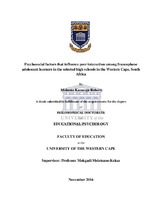| dc.description.abstract | Immigrant adolescent learners are at risk for loneliness, isolation, rejection, and interpersonal
distress from being perceived as outsiders or not belonging to the groups. This may be explained
by host country or setting discriminating against them and also the immigrant adolescents' initial
tentative engagement of host setting others. This study aimed to determine the relationship
between psychosocial factors (psychological factors: emotional regulation, aggressiveness,
sympathy, empathy; social support; and cultural differences), and peer interactions through
demographic details (gender, age, and grade level) among francophone adolescent learners in the
selected high schools in the Western Cape. It further purposed to determine the positive and
negative factors that can affect their peer interactions at high schools. This study established the
feasibility of recruitment procedures and developed a new model instrument of psychometric
properties to measure the psychosocial factors scale and peer interaction scale for francophone
adolescent learners in the selected high schools in the Western Cape Province. | |

